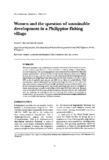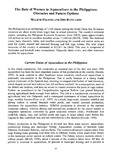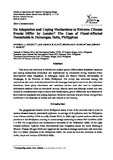Women and the question of sustainable development in a Philippine fishing village
- Global styles
- MLA
- Vancouver
- Elsevier - Harvard
- APA
- Help
Share
Abstract
This paper presents a case study of time use and contribution to the household income of men, women, and children in 12 households in a fishing village in Panay Island, central Philippines. The study highlights the differential impact of poverty on men and women and provides a glimpse of the intrahousehold dynamics within poor fishing households. Findings in previous studies in both industrialized and developing countries that women work longer hours than men were corroborated. Women contribute at least 22% to the household cash income and 40% of the value of unpaid labour. Their contribution to the household cash income becomes larger than that of men's when the value of livestock is computed. Women's daily participation in productive activities, such as fish vending and shucking oyster and mussel, unwittingly puts them in a position of being environmental recorders and verifiers of the state of fishery resources. Because they are burdened with the responsibility of making ends meet, they are also confronted with the challenge of realizing the dream of sending their children to university to enable them to escape poverty. This alone makes women one of the strongest stakeholders in the sustainable development of fishery resources.
Suggested Citation
Siar, S. V., & Cañeba, L. M. (1998). Women and the question of sustainable development in a Philippine fishing village. International Journal of Sustainable Development and World Ecology , 5(1), 51-58. https://doi.org/10.1080/13504509809469969
Type
ArticleISSN
1350-4509Collections
- Journal Articles [1262]
Related items
Showing items related by title, author, creator and subject.
-
The role of women in aquaculture in the Philippines: obstacles and future options
Felsing, Malene; Baticados, Didi (Gender and Development Studies, School of Environment Resources and Development, Asian Institute of Technology, 2001) -
Do adaptation and coping mechanisms to extreme climate events differ by gender? The case of flood-affected households in Dumangas, Iloilo, Philippines
Bagsit, Farisal U.; Suyo, Jee Grace B.; Subade, Rodelio F.; Basco, Josefa T. (Asian Fisheries Society, 2014)This study was conducted to identify and analyse gender-differentiated adaptation measures and coping mechanisms formulated and implemented by households during Typhoon Frank (international name Fengshen), in barangays ... -
Participation of women in oyster and mussel farming in Western Visayas, Philippines
Siar, Susana V.; Samonte, G. Pb.; Espada, A. T. (Blackwell Publishing, 1995)This paper provides baseline information on the involvement of women in small-scale coastal aquaculture such as the farming of slipper oyster, Crassostrea iredalei (Faustino 1933), and green mussel, Perna viridis (Linnaeus ...





